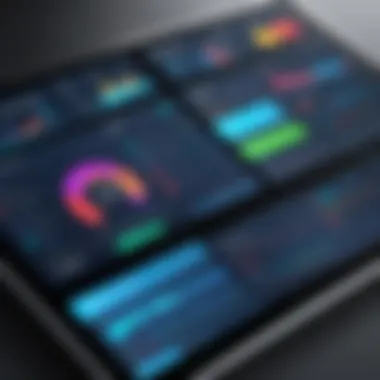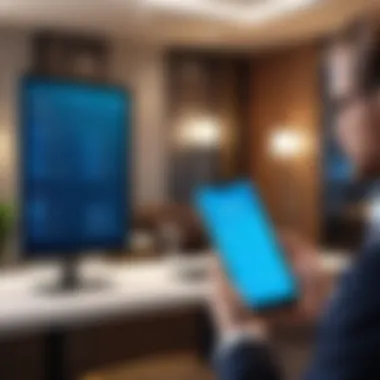Revolutionizing Hospitality with Smart Hotel Systems


Intro
In recent years, the hospitality industry has witnessed a significant transformation influenced by technology. Smart hotel systems emerge as a pivotal enabler, facilitating enhanced operations and remarkable guest experiences. This article aims to dissect the various components of smart hotel systems while illuminating their benefits, challenges, and future trends.
The discussion will focus on how these systems can impact small and medium-sized enterprises by optimizing their management practices, guest interaction, and operational efficiencies. Successful implementation hinges not only on understanding these innovations but also on making informed decisions regarding technology selection and software solutions.
Key Software Features
When exploring smart hotel systems, understanding their core software features is paramount. These systems integrate multiple functionalities that streamline daily operations and elevate guest satisfaction. The essential functionalities include:
- Property Management System (PMS): Enables comprehensive management of reservations, check-ins, and check-outs.
- Guest Management Tools: Facilitates personalized guest experiences by storing and analyzing preferences and past behaviors.
- Mobile Check-In/Out: Allows guests to bypass traditional front desk processes using their smartphones.
Advanced capabilities play a crucial role in differentiating between basic and sophisticated smart hotel systems. Some advanced features to consider are:
- Internet of Things (IoT) Integration: Connects devices in rooms that allow guests to control lighting, temperature, and entertainment seamlessly.
- Data Analytics: Harnesses big data to derive actionable insights for enhancing service and improving operational efficiency.
- Automation: Utilizes AI for tasks like room service and maintenance requests, leading to quicker response times and less labor intensity.
Comparison Metrics
In evaluating different smart hotel systems, certain metrics become essential. A comprehensive analysis of costs and performance can guide decision-makers toward the most suitable solution.
Cost Analysis
Consideration of upfront costs versus long-term savings is crucial. The initial investment may include software licensing, hardware upgrades, and training for staff. However, effective systems ultimately reduce labor costs, enhance revenues through better guest experiences, and lower operational inefficiencies.
Performance Benchmarks
Developing performance benchmarks allows for a more nuanced comparison of solutions. Important aspects to evaluate include:
- System Reliability: Uptime percentages and failure rates of software and hardware.
- User Satisfaction: Feedback from both guests and staff regarding system usability and functionality.
- Response Times: Speed with which requests are processed and executed.
Reflecting on these metrics will guide hoteliers in making informed decisions aligned with their operational and financial goals.
Understanding smart hotel systems can lead to improved operational efficiencies and better guest experiences, ultimately driving profitability.
As technology rapidly evolves, staying abreast of innovations in smart hotel systems is essential for maintaining competitiveness in the hospitality industry.
Definition of Smart Hotel Systems
The definition of smart hotel systems is crucial for understanding how technology reshapes the hospitality sector. These systems integrate various innovative technologies to create an environment that enhances guest experience and operational efficiency. Emphasizing the definition provides clarity on the basic concepts and allows industry professionals to assess the implications of adopting these systems.
Smart hotel systems typically utilize advanced tools to streamline operations, ensure better service delivery, and promote sustainability. To effectively harness these benefits, key areas like smart technologies and the components that make them function come into focus. The relevance of defining this term lies in the rapidly changing landscape of the hospitality industry, where traditional practices are consistently being challenged by tech-based improvements.
Overview of Smart Technologies
Smart technologies operate on the principles of connectivity and data exchange. Hotels leverage these innovations to automate tasks, manage resources effectively, and enhance guest interactions. For example, mobile applications allow guests to control room settings from their phones, thereby personalizing their experience. This is a win-win situation; it elevates guest satisfaction while optimizing energy consumption.
Through the integration of smart technologies, hoteliers can monitor real-time data, adapt to guests' demands, and innovate service delivery. These aspects underscore the importance of smart technologies in contemporary hospitality practices.
Key Components
The key components of smart hotel systems include the Internet of Things (IoT), automation and control systems, and data analytics and reporting. Each of these plays a significant role in achieving a coherent smart hotel environment.
Internet of Things (IoT)
The Internet of Things (IoT) refers to the network of interconnected devices that communicate with each other. In smart hotels, IoT technology is pivotal in creating a cohesive atmosphere. It allows hotel systems to gather data from various sources, leading to enhanced decision-making. One of the key characteristics of IoT is its ability to connect different elements, such as room sensors and user devices, into a single operational framework. This interconnectedness is a beneficial choice as it offers real-time monitoring of guest needs and preferences.
A unique feature of IoT is its capability for predictive maintenance. For example, sensors can detect equipment issues before they impact guest experience. However, the reliance on interconnected devices can raise some concerns about data security and privacy, which hotels must address systematically.
Automation and Control Systems
Automation and control systems allow hoteliers to streamline numerous operations. These systems automate tasks like check-in processes, room service requests, and maintenance operations. A primary characteristic is their ability to reduce human error by relying on programmed instructions. This aspect is a beneficial choice, as it leads to greater consistency and efficiency in hotel operations.
One unique feature of these systems is their capacity for customizability. Hotels can tailor these systems to meet specific organizational needs, enhancing operational agility. While automation provides many advantages, over-reliance on technology may lead to challenges, such as diminishing personal interactions with guests.


Data Analytics and Reporting
Data analytics and reporting play an integral role in the functioning of smart hotel systems. They offer insights into guest behavior, preferences, and operational trends. A key characteristic of data analytics is its ability to transform raw data into actionable insights. This tool is crucial for making data-driven decisions that can enhance guest experiences and profitability.
A unique feature of data analytics is the ability to predict trends and identify areas for improvement. For instance, analyzing guest feedback can help hotels adapt their services to better meet customer expectations. Nonetheless, the challenges that come with managing vast amounts of data can be significant, requiring robust solutions for effective handling.
"The integration of smart technologies not only improves guest satisfaction but also optimizes operational efficiencies in the hospitality industry."
Benefits of Smart Hotel Systems
Smart hotel systems offer a multitude of benefits that are transforming the hospitality industry. These advantages extend beyond mere convenience; they fundamentally enhance operational efficiency, improve guest experiences, reduce costs, and promote sustainability. Exploring these benefits can provide industry professionals with key insights into how smart technologies can influence hotel management and customer satisfaction.
Improved Operational Efficiency
One primary advantage of smart hotel systems is their capacity to significantly improve operational efficiency. By integrating various technologies, hotels can streamline processes, reduce manual labor, and minimize errors in tasks such as booking management and staff coordination. For instance, automation tools can manage room assignments, housekeeping schedules, and maintenance requests efficiently. This allows staff to focus on higher-value interactions with guests, enhancing overall productivity.
In addition, real-time data analytics provides valuable insights into hotel operations. Managers can access analytics on occupancy rates, guest preferences, and service usage. Access to this data allows for informed decision-making, helping to optimize everything from staffing levels to resource allocation. Automating routine tasks not only reduces labor costs but also increases the speed at which services are delivered, thus benefiting both hotel staff and patrons alike.
Enhanced Guest Experience
Creating a memorable guest experience is vital in today's competitive hotel market. Smart hotel systems enhance this experience in various ways.
Personalized Services
Personalized services are a crucial element of enhanced guest experiences. Smart technology enables hotels to gather and analyze guest data, such as past stays and preferences. This information can be used to offer tailored options, such as personalized greetings, customized room settings, and special offers that match guests' interests. The key characteristic of personalized services lies in their ability to make guests feel valued and understood.
Implementing personalized services can be seen as beneficial for several reasons. Guests are increasingly looking for experiences that go beyond the standard hotel stay. Unique features like room customization and curated local experiences can significantly boost guest satisfaction. Despite these benefits, it is worth noting that reliance on data must be handled judiciously to avoid privacy concerns.
Convenience Features
Convenience features represent another vital aspect of enhancing guest experiences. From mobile check-ins to smart room controls, these functionalities allow guests to tailor their hotel experience easily. Typical features include app-controlled lighting and temperature settings, which can lead to a more personalized stay.
The convenience of being able to control room settings at guests' fingertips makes this an appealing choice for hotels aiming to stand out. This kind of accessibility improves customer satisfaction and can lead to positive reviews. Nevertheless, implementation challenges, such as ensuring user-friendly interfaces, might arise, which hotels must address to maximize the advantages of these features.
Cost Reduction
Smart hotel systems also play a significant role in cost reduction. By integrating advanced technology, hotels can find opportunities to cut costs across various operational areas. For instance, smart energy management systems can help hotels optimize their energy use, leading to sizeable savings on utility bills.
Maintenance costs can also be reduced through predictive maintenance tools. By monitoring equipment health via IoT devices, hotels can identify potential issues before they become costly repairs.
Moreover, labor costs might decrease as automation takes over repetitive tasks. All these aspects contribute to a stronger bottom line, fostering long-term financial sustainability for hotel businesses.
Sustainability Impact
In recent years, sustainability in hospitality has become more pressing. Smart hotel systems contribute positively to sustainable practices in several ways.
Energy Efficiency
Energy efficiency is one notable aspect where technology integrates well with sustainable practices. Smart systems can monitor energy consumption in real-time, allowing hotels to implement changes instantly to reduce waste. For example, automated lighting systems turn off lights when rooms are unoccupied, significantly cutting down on energy use without sacrificing guest comfort. This feature reflects an increased awareness of corporate responsibility while appealing to eco-conscious guests.
Moreover, energy management systems provide data that can be useful for future sustainability initiatives. Quantifying energy use can help hotels set ambitious goals for reduction in consumption.
Resource Management
Resource management strategies in smart hotel systems focus on optimizing the use of water and other essential resources. Advanced systems enable hotels to monitor water usage closely, helping to identify leaks or inefficient practices promptly.
Another significant feature is the integration of waste management technologies, which help in analyzing waste production patterns. Consequently, hotels can improve recycling efforts and reduce waste output. Such resource-efficient systems offer a competitive advantage as they align with growing consumer demand for responsible and sustainable business practices.
Overall, the advantages of smart hotel systems create a robust framework for improving operations and guest satisfaction, marking a significant shift in how hotels interact with their clientele and manage resources.
Challenges in Implementing Smart Hotel Systems
Implementing smart hotel systems is not devoid of obstacles. Understanding these challenges is essential for industry professionals and decision-makers. The proliferation of technologies in the hospitality sector promises efficiency gains and enhanced guest experiences. However, without addressing the underlying challenges, the full potential of smart systems may remain untapped.


The key areas of concern include initial investment requirements, complexity of technology integration, and, most importantly, data privacy issues. Addressing these aspects will enable hotel managers to make informed decisions that ensure long-term success when adopting smart technologies.
High Initial Investment
One of the primary challenges hotels face when implementing smart systems is the high initial capital investment. Acquiring cutting-edge technologies often comes with significant costs. For many small and medium-sized enterprises, the financial burden can be a major deterrent.
Investments may encompass various aspects, such as:
- Purchase of hardware and software
- Installation of new systems and infrastructure platforms
- Ongoing maintenance and updates
"Cost barriers often limit smaller hotels from adopting smart technologies, despite the long-term savings they may bring."
Consequently, hotels must conduct thorough return-on-investment analyses to justify these expenses. It is crucial to assess not only the direct costs but also potential savings in operations and improvements in guest satisfaction that smart technologies promise.
Integration Complexity
Another significant challenge is the complexity involved in integrating various technologies into existing systems. Smart hotel systems often comprise numerous devices and software, including Internet of Things devices, automation systems, and data analytics platforms. Ensuring seamless communication between these diverse elements requires careful planning.
Hoteliers may encounter:
- Compatibility issues with legacy systems
- The need for extensive employee training
- Coordination among different vendors
Such integration complexity can lead to extended downtimes during implementation and disrupt ongoing operations. Therefore, having a clear integration roadmap that outlines steps and contingencies is vital. Collaboration with knowledgeable vendors and IT professionals will also foster smoother transitions.
Data Privacy Concerns
Data privacy stands as a paramount concern in the deployment of smart hotel systems. With the increased reliance on data collection and analytics, hotels must handle sensitive guest information responsibly. Failure to do so can result in reputational damage, legal penalties, and loss of customer trust.
Important factors to consider include:
- Compliance with data protection regulations such as GDPR
- Secure storage and safeguarding of personal information
- Transparency with guests regarding data usage
Building robust security protocols and implementing stringent privacy policies are essential steps hotels must take. Additionally, educating staff on data protection measures will further reduce risks.
In summary, while smart hotel systems offer substantial opportunities for enhancements and efficiencies, addressing the challenges of high initial investment, integration complexity, and data privacy concerns is crucial. By preparing thoroughly for these challenges, hotels can effectively leverage technology to create richer guest experiences and optimize operations.
Future Trends in Smart Hotel Systems
The realm of smart hotel systems is evolving rapidly. Understanding these future trends is crucial for industry stakeholders, especially as technology continues to reshape guest interactions and operational methodologies. Predicting the future of smart hotels focuses on leveraging advancements to deliver superior services, streamline operations, and enhance overall customer satisfaction.
Artificial Intelligence in Guest Services
Artificial intelligence is set to revolutionize how hotels interact with guests. The integration of AI-powered chatbots into hotel systems enables 24/7 support, answering queries in real time. This allows staff to focus on more complex tasks—improving service quality overall.
Moreover, AI can analyze guest behavior to offer personalized recommendations, enhancing the overall experience. For instance, if a guest frequently requests room service at certain times, the system can predict this need and suggest specials or new items in that time frame. Such tailored experiences create a more engaging environment for guests and can positively impact brand loyalty.
Key Benefits of AI in Guest Services:
- Personalization: Tailoring services based on individual preferences.
- Efficiency: Reducing wait times through quick responses.
- Data Utilization: Harnessing data analytics to improve service delivery.
"The implementation of AI could become a game-changer in how hotels manage guest relationships."
Growth of Contactless Solutions
Contactless solutions have gained significant ground, especially in the wake of global health concerns. These technologies allow guests to check in and check out without physical interaction, often through mobile apps or kiosks. The demand for contactless payment methods has also surged, further streamlining transactions.
As travelers prioritize safety and convenience, hotels adopting contactless solutions position themselves favorably in the market. They not only enhance guest satisfaction but also reduce the workload on staff, thereby optimizing operational efficiency.
Notable Features of Contactless Solutions:
- Mobile Room Keys: Guests can unlock their rooms with smartphones, reducing the need for physical keys.
- Remote Check-in and Check-out: Minimizing queues at the front desk.
- Payment Solutions: Offering safe, cashless transactions through multiple platforms.
These innovations highlight crucial changes within the hospitality sector. Keeping abreast of these trends is imperative not just for large hotels but also for small and medium-sized enterprises aiming to remain competitive in this evolving landscape.


Case Studies of Successful Smart Hotel Implementations
Exploring the case studies of successful smart hotel implementations provides critical insights into how innovative technologies are being applied in real-world settings. These examples offer a practical understanding of the concepts discussed earlier in this article. Observing the results accomplished by various hotels helps industry professionals gain knowledge about best practices, challenges faced, and the overall impact on customer experience and operational efficiency.
Real-life applications illustrate the advantages and practicality of smart technologies in hospitality. By studying how these systems enhance operational effectiveness and guest satisfaction, stakeholders can make informed decisions about adopting similar technologies in their establishments.
Luxury Hotels
Luxury hotels often lead the way in integrating smart systems. These establishments prioritize offering personalized experiences and impeccable service to their guests. For instance, The Ritz-Carlton has implemented advanced room automation features that allow guests to control lighting, temperature, and entertainment systems through their smartphones.
Another notable example is the Marriott International. They have introduced mobile check-in and digital room keys, which provide guests with seamless access to their rooms, reducing waiting times at the front desk. The investment in these technologies reflects both a commitment to guest satisfaction and a strategy to streamline operations, ultimately increasing profitability.
Boutique Properties
Boutique hotels often thrive on unique experiences and intimate settings. Smart implementations in such establishments may vary significantly, focusing on distinctive guest interactions. For example, the Hotel Zetta in San Francisco showcases a curated approach with its integration of smart technology. Guests can control room features through a proprietary app while also enjoying personalized recommendations for local experiences. The technology not only enhances guest experience but also reinforces the hotel’s unique identity.
These smaller properties can achieve efficiency gains in operations with smart inventory management systems and automated check-out processes, further attracting tech-savvy clientele who appreciate innovation without sacrificing character.
Chain Hotels
Chain hotels present a different set of opportunities for smart technology use. Brands like Hilton have embraced the trend with their Connected Room feature, allowing guests to use their mobile devices to personalize their room experience. By giving guests the ability to control various aspects of their room environment, Hilton enhances guest comfort and satisfaction.
The use of data analytics in chain hotels also plays a significant role in tailoring marketing strategies and improving operational efficiencies. For instance, by analyzing stay patterns and preferences, these hotels can effectively manage staffing and inventory, ensuring high levels of service amid varying demand.
Selecting the Right Smart Hotel Solutions
Choosing the appropriate smart hotel solutions is crucial for maximizing the potential benefits such systems offer. This process involves a comprehensive assessment of a hotel's unique requirements and capabilities. Decision-makers must understand that the right technologies can greatly influence operational efficiency, guest satisfaction, and overall competitiveness in a rapidly evolving market.
Assessing Business Needs
Before investing in smart hotel technology, it’s essential to assess specific business needs. A clear understanding of what the hotel aims to improve or achieve can guide the selection process.
- Identify operational challenges: Determine which processes are currently inefficient or contribute to guest dissatisfaction. This could range from manual check-in procedures to inadequate room management systems.
- Set clear objectives: Establish what the hotel hopes to gain from implementing smart technologies. This might include improving guest experiences, reducing energy consumption, or gaining better insights through data analytics.
- Engage stakeholders: Involve staff who will use the systems in decision-making. Their insights can help identify practical needs that technology needs to address.
Evaluating Vendor Options
Once business needs are identified, evaluating potential vendors becomes paramount. The hotel should consider several factors before settling on a particular solution provider.
- Reputation and experience: Research vendors with a proven track record in the hospitality industry. Check testimonials and case studies to understand how they have helped similar businesses.
- Support and training: A good vendor offers ongoing support and training to ensure staff can effectively use the technology. Evaluate the level of customer support offered post-implementation.
- Cost structures: Understand the total cost of ownership, which includes initial installation, ongoing maintenance, and potential upgrades. Compare this against the expected return on investment to find a financially viable option.
Understanding Technology Scalability
Finally, the scalability of technology solutions must be recognized. As hotel requirements change over time, implementing scalable systems is vital to future-proofing the investment.
- Flexible architecture: Look for systems that can expand in functionality without requiring a complete overhaul. This includes modifiable interfaces and upgrade paths.
- Integration with existing systems: Ensure new solutions can seamlessly integrate with current systems like Property Management Systems (PMS) and Customer Relationship Management (CRM) platforms.
- Adaptation to market trends: Choose vendors that frequently update their solutions to incorporate emerging technologies and market needs, keeping the hotel competitive.
In summary, selecting the right smart hotel solutions involves careful consideration of business needs, vendor evaluation, and an understanding of scalability. This well-rounded approach will equip hotels to navigate the complexities of modern hospitality management effectively.
Closure: The Future Landscape of Smart Hotels
The exploration of smart hotel systems presents significant insights regarding the future of the hospitality industry. These systems not only embody technological innovation but also carry long-term implications for operational models and guest interactions. Integrating smart technologies is not merely a trend; it is becoming a necessity for hotels aiming to stay relevant in an increasingly competitive landscape. Focusing on this conclusion, we consider how these advancements shape both current practices and future expectations.
Long-Term Implications for the Industry
As hotels adopt smart systems, several long-term implications arise for the industry. First, the shift towards automation can lead to a reduction in labor costs. By deploying advanced technology solutions, hospitality businesses can reallocate resources, directing human efforts toward areas that enhance guest satisfaction. This adjustment fundamentally changes workforce dynamics within hotels, necessitating new skills and roles focused on technology management.
Additionally, smart hotel systems facilitate a transformation in guest analytics. Collecting and analyzing data improves understanding customers’ preferences and behaviors. Ultimately, this leads to increasingly customized experiences. Over time, the expectation for personalization will intensify, compelling hotels to continuously adapt their offerings in response to evolving consumer demands.
With more guests valuing sustainability, the integration of energy-efficient technologies further reinforces a hotel's reputation. The long-term commitment to reducing environmental impacts can distinguish a property. This approach might attract new clientele while retaining existing ones who prioritize responsible practices. Moreover, collaborating with tech firms can foster innovation and agility against competitors.
The Role of Technology in Shaping Guest Experiences
Technology plays a crucial role in enhancing guest experiences within smart hotels. The presence of user-friendly interfaces and integrated systems ensures a seamless interaction from booking to check-out. Services that include mobile check-in, personalized room settings, and instant feedback mechanisms dramatically elevate guest satisfaction.
Moreover, AI-driven chatbots and virtual concierges provide immediate assistance, while IoT devices enhance comfort. Guests can control room temperature, lighting, and entertainment systems according to their preferences without direct staff intervention. This convenience ultimately leads to a more enjoyable stay, making technology a foundational element of modern hospitality experiences.
"Smart hotel systems represent a paradigm shift in the hospitality industry, combining high-tech amenities with refined guest service to meet the demands of a discerning clientele."
As the industry embraces a mixed model of in-person and technology-driven services, the expectations of future guests will lean heavily towards enhanced convenience and personalization. Forward-thinking hotels will likely explore AI capabilities and data analytics to meet these demands efficiently.
In summary, the future landscape of smart hotels not only hinges on embracing technology but also adapting to changing consumer behavior. The implications are profound, affecting both operational strategies and guest engagement. It is imperative for the industry to recognize and act on these trends to foster sustainability, connection, and satisfaction in the evolving hotel experience.



